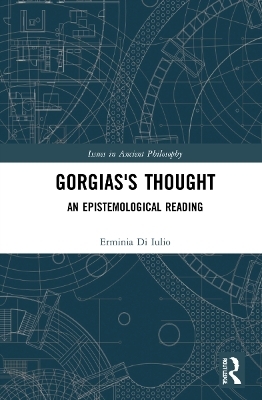
Gorgias's Thought
An Epistemological Reading
Seiten
2024
Routledge (Verlag)
978-1-032-23443-4 (ISBN)
Routledge (Verlag)
978-1-032-23443-4 (ISBN)
The first monograph in English on Gorgias's epistemological thought, this book considers his major texts through philological analysis and epistemological approaches, showing that Gorgias is first and foremost an epistemologist. Suitable for students and scholars of ancient thought, epistemology, and history of philosophy.
Gorgias’s Thought: An Epistemological Reading is the first monograph published in English entirely devoted to Gorgias’s epistemological thought and provides a new perspective on Gorgias’s thought more broadly.
The book aims to undermine the common idea that Gorgias is either an orator uncommitted to any conception of truth, or a thinker whose interest is confined to the philosophy of language. It considers his major texts—On What is Not, or On Nature, The Apology of Palamedes and The Encomium of Helen—emphasising the originality and specificity of Gorgias’ thought. In combining a philological analysis with substantive use of contemporary epistemological approaches, Di Iulio shows that Gorgias is to be considered first and foremost an epistemologist.
Gorgias’s Thought: An Epistemological Reading is of interest to students, scholars and specialists in ancient thought, epistemology, history of philosophy and rhetoric.
Gorgias’s Thought: An Epistemological Reading is the first monograph published in English entirely devoted to Gorgias’s epistemological thought and provides a new perspective on Gorgias’s thought more broadly.
The book aims to undermine the common idea that Gorgias is either an orator uncommitted to any conception of truth, or a thinker whose interest is confined to the philosophy of language. It considers his major texts—On What is Not, or On Nature, The Apology of Palamedes and The Encomium of Helen—emphasising the originality and specificity of Gorgias’ thought. In combining a philological analysis with substantive use of contemporary epistemological approaches, Di Iulio shows that Gorgias is to be considered first and foremost an epistemologist.
Gorgias’s Thought: An Epistemological Reading is of interest to students, scholars and specialists in ancient thought, epistemology, history of philosophy and rhetoric.
Erminia Di Iulio received her Ph.D from Tor Vergata University, Rome, in 2020, and works primarily on ancient philosophy. Her research interests include epistemology, epistemology of testimony and philosophy of perception. She co-founded the open access journal Synthesis—Journal for Philosophy.
Acknowledgements, Introduction, 1. The First Thesis of the Treatise: Gorgias On What There Is, 2. The Second Thesis Of The Treatise: Gorgias On Epistemology And Scepticism, 3. The Apology Of Palamedes: Gorgias On Foundationalism, Eyewitnessing And True Speech, 4. The Encomium Of Helen: The Epistemology Of Persuasion, 5. The Third Thesis Of The Treatise: The Epistemic Root Of Gorgias’s Philosophy Of Language, Conclusions.
| Erscheinungsdatum | 17.08.2022 |
|---|---|
| Reihe/Serie | Issues in Ancient Philosophy |
| Verlagsort | London |
| Sprache | englisch |
| Maße | 156 x 234 mm |
| Gewicht | 312 g |
| Themenwelt | Geschichte ► Allgemeine Geschichte ► Vor- und Frühgeschichte |
| Geisteswissenschaften ► Philosophie ► Erkenntnistheorie / Wissenschaftstheorie | |
| Geisteswissenschaften ► Philosophie ► Philosophie Altertum / Antike | |
| ISBN-10 | 1-032-23443-1 / 1032234431 |
| ISBN-13 | 978-1-032-23443-4 / 9781032234434 |
| Zustand | Neuware |
| Haben Sie eine Frage zum Produkt? |
Mehr entdecken
aus dem Bereich
aus dem Bereich
auf den Spuren der frühen Zivilisationen
Buch | Hardcover (2023)
C.H.Beck (Verlag)
CHF 27,95
Konzepte – Methoden – Theorien
Buch | Softcover (2024)
UTB (Verlag)
CHF 55,85
Was Pompeji über uns erzählt
Buch | Hardcover (2023)
Propyläen (Verlag)
CHF 44,75


